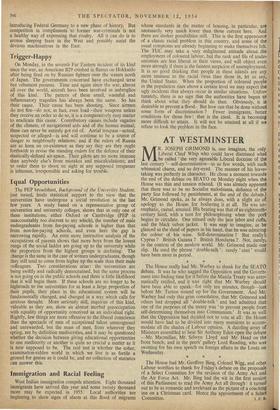AT WESTMINSTER
MR. JOSEPH GRIMOND is, one imagines, the only Liberal Chief Whip who could have dismissed what he called 'the very agreeable Liberal doctrine of the last century '—self-determination—in so few words, with such whimsical charm, and so dry-eyed. The manner of his leave. taking was perfectly in character. He chose a moment towards the end of the debate on SEATO on Monday night when the House was thin and tension relaxed. (It was already apparent that there was to be no Socialist melodrama, defiance of the party line followed by punishment, at the end of the debate.) Mr. Grimond spoke, as he always does, with a slight air of apology to the House for bothering it at all. He was un- emphatic, casual. amused. His bearing was that of an eighteenth" century laird, with a turn for philosophising when the port begins to circulate. One missed only the lace jabot and cuffs, and the black velvet jacket. It was eapjr to imagine, as he glanced at the sheaf of papers in his hand, that he was admiring the colour of his wine. Self-determination ? But really!! Cyprus ? British Guiana ? British Honduras ? Not, surely, in the context of the modern world. Mr. Grimond made on6 slip. He used the phrase ' double-talk ': surely ' cant ' Would . have been more in period.
* * * The House really had Mr. Warbey to thank for the SEATO debate. It was he who nagged the Opposition and the Govern- ment into finding time for it before the Manila Treaty was auto- matically ratified, and it was right that Mr. Warbey should have been able to speak—for only ten minutes, though—just before Mr. Turton wound up for the Government. And Mr. Warbey had only this grim consolation, that Mr. Grimond and others had dropped all ' double-talk ' and had admitted that one of the purposes of the treaty was 'to prevent people from self-determining themselves into Communism.' It was as well that the Opposition had decided not to vote at all: the House would have had to be divided into many mansions to accom- modate all the shades of Labour opinion. A dazzling array of Ministers assembled to hear Sir Anthony Eden open the debate —Mr. Macmillan, Mr. Selwyn Lloyd and Mr. Head on the front bench; and in the peers' gallery Lord Reading, who was swotting for his own speech on foreign affairs in the Lords on Wednesday. * * * The House had Mr: Geoffrey Bing, Colonel Wigg, and other Labour worthies to thank for Friday's debate on the proposals of a Select Committee for the revision of the Army Act and the Air Force Act. Mr. Bing had the wit in the first session of this Parliament to read the Army Act all through : it turned out to be as romantic and irrelevant as the picture of a coaching inn on a Christmas card. Hence the appointment of a Select


































 Previous page
Previous page